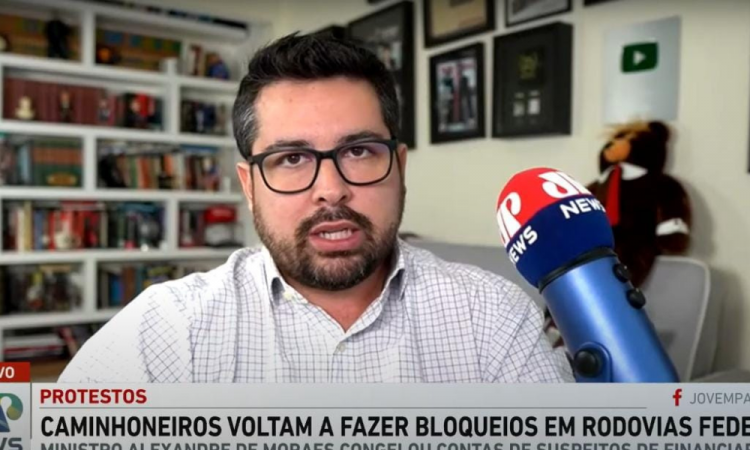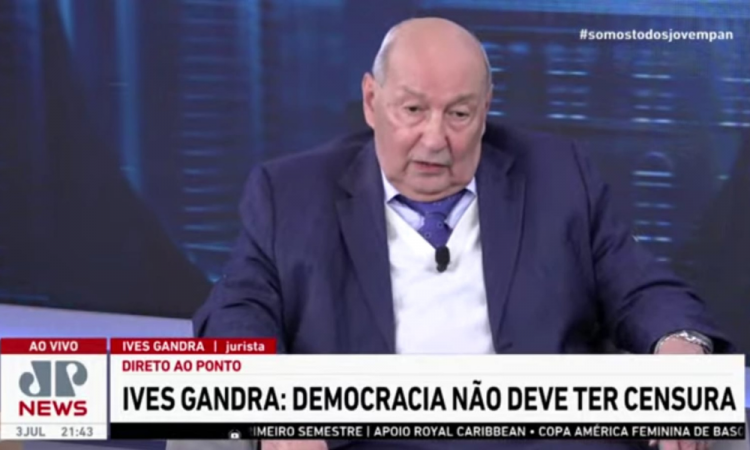In the last decade, Grupo Jovem Pan was the largest media conglomerate to host and disseminate ideas from the far right in Brazil. Anti-scientific theses on vaccines, attacks without evidence on the fairness of the electoral process, allusions to a supposed dictatorial pretension of progressive politicians: there was no shortage of space for conspiracy theories on this radio station. In 2014, it took an editorial turn and adopted an openly ultraconservative bias, thus achieving great success and even managing to open its own channel on cable TV in 2021.
Founded in 1944, the group now faces the biggest legal challenge in its history, with a request by the Federal Public Ministry (MPF, by its Portuguese acronym) in São Paulo to cancel the broadcasting rights of its three radio stations, as well as the payment of a multimillion dollar fine in damages to the State and the obligation to broadcast content about the integrity of the Brazilian electoral process in between the network's regular TV programming.
Unprecedented since the redemocratization of the country in 1988, the lawsuit, which has yet to be judged, accuses the radio station of "repeatedly spreading content that discredited, without evidence, the 2022 electoral process, attacked authorities and institutions of the Republic, incited disobedience to laws and judicial decisions, defended the intervention of the Armed Forces over the established civilian powers, and encouraged the population to subvert the political and social order.”

The current logo of Jovem Pan
In an editorial published the same day the lawsuit was announced, Jovem Pan said it was the victim of an intimidation and censorship attempt by the Public Ministry. Freedom of the press, Jovem Pan says, is ensured by the Brazilian Constitution, so the request for the revocation of broadcasting rights is also an attack against the democratic state. "No matter if from the left, right, center or apolitical, defending the closure of a news outlet is an attack against democracy," Jovem Pan said.
Experts in censorship and freedom of expression explained the grounds for the lawsuit to LatAm Journalism Review (LJR). According to them, the MPF's request is indeed compatible with Brazilian law, which makes a series of requirements to guarantee the right of broadcasting that Jovem Pan may have violated. Although they understand that the Judiciary, which has acted vigorously to combat disinformation in Brazil, may sometimes go too far, this is not the case this time, because the Brazilian legislation is clear in this regard, they said. In addition, the lawsuit also exposes the obsolescence of the regulatory framework of broadcasting norms in Brazil, which dates back to 1962.
Comprised of 215 pages, the lawsuit submitted to the Federal Court by federal prosecutors aims to "hold Jovem Pan responsible for the systematic and multifaceted broadcasting, at least between Jan. 1, 2022 and Jan. 8, 2023, of disinformation about the functioning of national public institutions, contextually linked to content inciting violence and the breakdown of the Brazilian democratic regime.”
Although they emphasize that "they are fully aware of the fundamental value of freedom of expression, journalism and broadcasting in Brazil, especially considering our tragic history, still recent, of dictatorships and authoritarian governments," prosecutors Yuri Corrêa da Luz and Ana Leticia Absy, responsible for the accusation, believe this privilege was abused.
The prosecutors recall that the broadcasting service in Brazil depends on public concessions, and is therefore subject to a legal regime marked by stricter limits than those valid for other producers and broadcasters of content, such as those, for example, of printed publications or the Internet. Because it depends on a limited spectrum of electromagnetic waves, radio can only be pursued under State stewardship, being under stricter review than other media, which can be used by an indefinite number of actors.
According to the indictment, the conduct of the radio station "had real potential to incite violent acts and democratic rupture," citing as an example the attempted coup on Jan. 8, when supporters of former president Jair Bolsonaro invaded and vandalized the headquarters of the three branches of government in Brasilia.
A long section of the indictment, almost 150 pages long, is dedicated to describing and examining Jovem Pan's allegedly illicit conduct. The group reproduces the radio's own programming on its YouTube channel, so that prosecutors could easily access the programming, focusing on four highly successful programs, "Os Pingos nos Is [The ins and outs," "3 em 1" [3 in 1]," "Morning Show," and "Linha de Frente [Frontline]."

Call for the program "Os pingos nos Is", one of Jovem Pan's greatest successes, from January 11, 2021 (Photo: Courtesy)
Jovem Pan has adopted a journalism model strongly marked by political analysis and commentary. In general, an anchor makes a brief presentation of a news item, and then the topic passes on to the analysts, who are the real protagonists of the shows.
According to the accusation, these commentators, although laymen, systematically "conveyed peremptory speeches, capable of undermining people's confidence in the soundness of the electoral process underway and of feeding the feeling that we would live in an anomie, with ‘illegal’ and ‘unconstitutional acts’ supposedly practiced by various Brazilian authorities being cited daily without any basis.”
The dozens of charges listed by the MPF fall into four categories: 1) spreading disinformation about the smoothness of the democratic processes taking place in the country and about the functioning of the constitutional powers; 2) spreading content inciting disobedience to legislation and judicial decisions, by the population in general and by police forces; 3) spreading content inciting rebellion, unruliness, and intervention by the Brazilian Armed Forces on the constitutional civil institutions and powers: 4) broadcasting content encouraging and legitimizing subversion of the political and social order as well as illegal demonstrations.
Countless commentators quoted by the lawsuit insisted there is no transparency or reliability in the Brazilian electoral process, and some cases listed by the MPF draw more attention. For example, commentator Caio Mastrodomênico — whose background is in dentistry — said without any proof on Nov. 10, 2022 that all countries that, like Brazil, use electronic ballot boxes, "end up with exactly this result," in relation to the numbers of the presidential election held 10 days before.
Several commentators advocated an insubordination to court orders and more or less explicitly called for a military intervention or a revolution in the country. Mastrodomênico himself stated on Dec. 2 that "the only way to restore order is through chaos."
Another commentator, Fernão Lara Mesquita, stated on air that, by recognizing the election result, the Brazilian Judiciary was only leaving open "for the voiceless the way to violence, the way to strike, to blockade, whatever (...) They are demoralizing democracy itself and throwing gasoline on the fire of national insecurity, they are closing the institutional exits to the crises and leaving open only the doors of violence.”
Paulo Figueiredo, one of the most aggressive voices, even proposed a "civil war" as an alternative to the alleged institutional impasse. "Either we accept an election without transparency, without legitimacy, without the trust of the population, or we accept all this, and bow our heads, or we'll have a civil war," he said the day after the election, before concluding: "Then, let there be a civil war, dammit! What kind of laxity is this?

Paulo Figueiredo, one of the most influential and aggressive voices asking for a military intervention in Jovem Pan according to the MPF (Photo: Screenshot of Jovem Pan News)
Calling for a military intervention, the same commentator said on Dec. 22, 2022: "You [Armed Forces][ will defend the homeland, and those crooks will react. Hey, whack [kill] them! You were trained for this.”
Due to several statements like these, the Public Ministry believes Jovem Pan violated article 53 of the Brazilian Broadcasting Code of 1962. This article states that it’s considered an abuse to utilize the radio to, among other things, “incite disobedience to laws or judicial decisions;” “make propaganda for war or subversion of the political and social order;” “encourage rebellion or unruliness of the Armed Forces or public security organizations;” “spread false news, endangering the public, economic and social order;” and “collaborate in the practice of rebellion, disorder or banned demonstrations.”
According to the MPF, the legal action "does not turn against speech that is a legitimate part of the ordinary political and ideological dissent in plural societies, but rather seeks proper accountability of those who, by practicing serious illegal acts, abused public service concessions and distorted the principles and social purposes that support them.”
The MPF is asking for the revocation of only the three radio licenses that Jovem Pan holds in São Paulo and Brasília, but does not cover the Pay TV channel or YouTube. The request only refers to the radio stations "due to the fact that broadcasting is a public service, granted or allowed by the Union to private parties interested in exploiting it," according to the MPF. The content of the radio stations is reproduced nationally in 103 companies that act as their affiliates.
In addition to the revocation, the MPF asks that Jovem Pan be ordered to pay R$13.4 million [US $2.75 million] as compensation for collective moral damages. Also, that the Federal Court oblige the station to broadcast, at least 15 times a day between 6 a.m. and 9 p.m. for four months, messages of two to three minutes containing official information on the reliability of the electoral process.
When contacted by LJR, both the MPF and Jovem Pan declined to comment. The radio station's defense came mainly through an editorial published on the same day the lawsuit was announced, titled "An attack against democracy."
Four paragraphs long, the text stated that the group was being attacked for defending conservative positions. "Jovem Pan dared to make evident its conservative principles, and for that it was attacked. Jovem Pan dared to question, criticize, and show there is not only one worldview, and for that they are attacked. Jovem Pan dared become the voice of millions of Brazilians, and for that it was attacked," said the editorial.
The text recalled that "freedom of the press is protected by the Constitution — the same Charter that guarantees citizens the right to question, criticize, think, and freely express their ideas. According to the group, "Jovem Pan has been systematically persecuted precisely because it plays this role and gives voice to the ideas of a significant portion of the population. A company whose trustworthiness is unquestionable, a station whose services to Brazilian society fill pages and pages of Brazilian history is under attack, precisely because it dares to be what is expected of it: Free, independent, diverse, and critical.
According to Jovem Pan, what is at issue in this process "is your right to question and to have a news outlet that represents what you think and respects the plurality of ideas and the adversarial. It's about living in a country that does not use democracy as an instrument for the suppression of citizens' rights."
Finally, the radio said that "it is not acceptable that Brazilian society give support to criminal groups that act in the shadows, hidden behind avatars on social media, to terrorize companies to promote the financial strangulation of a media group. It is even less acceptable that representatives of the State join this movement using fallacious and biased narratives to legitimize the character assassination of a company that has always borne all its responsibilities. Jovem Pan has never deviated from its commitment to Brazil and to Brazilians. And it will not do so now. You [the audience] must not deviate from your commitment to the citizenry."
Aside from the editorial, Jovem Pan has aired the opinion of conservative jurists, who say that the lawsuit violates the right of freedom of expression explicit in the Constitution. However, they fail to discuss the limitations to this right that exist within the framework of the right to broadcast.
On July 3, for example, the station aired a debate where only voices in its defense participated. On the occasion, the well-known conservative jurist Ives Gandra called the process "censorship." "The lungs of society have to be the press. At the present moment, we are living, then a struggle of redemocratization. Today there is a command of what is democratic of what is not. What you can say and what you cannot. This endangers being able to hold a wide debate, with both situation and opposition. Freedom of speech is taking a hit," he said.

Brazilian conservative law expert Ives Gandra, one of the voices heard by Jovem Pan in its defense; 'democracy should not have censorship', says the subtitle (Photo: Jovem Pan News Screenshot)
Former Labor Minister Almir Pazzianotto agreed with his colleague. "We are experiencing a direct threat to the democratic regime of a free press. I hope they are aware of the risk we run of going backwards. Without a free press, there is no democratic regime," he said.
This was also the position of conservative jurist and politician Fernando Capez, from the Brazil Union party. "You use the narrative of defending democracy to attack it. The free expression of thought and intellectual activity of communication cannot be limited by any kind of interpretation," he said during the debate.
In a statement, the Brazilian Association of Radio and Television Broadcasters (Abert), which represents radio and TV broadcasters, said it considers the public civil action filed by the MPF "very worrying." "The revocation of a broadcasting license is an extreme and serious measure, without precedent in our Democratic State of Law. The programming freedom of broadcasters is fundamental for the free exercise of journalism and for the existence of pluralism of opinion, which should always be preserved," he said.
Despite the attacks on the lawsuit, three independent experts in freedom of expression and censorship consulted by LJR said the action of the MPF is well-founded and that Brazilian law prohibits the systematic broadcasting of content such as that for which Jovem Pan is being sued.
An expert in freedom of expression on the internet, law professor Ivar Alberto Hartmann, who teaches at Insper [the Teaching and Research Institute] , in São Paulo said that "among the responses Brazilian institutions have given to the rampant spread of disinformation in the last two years, this is one that is best supported by legislation.” He teaches a.
Hartmann says he sees problems in other legal actions of the Brazilian Justice system to combat disinformation, citing as a questionable example the decisions of the Superior Electoral Court (TSE) that ordered Jovem Pan to give a right of reply to then-candidate Luiz Inácio Lula da Silva during last year's elections. According to him, the same problems are not valid in the current situation.
"This action against Jovem Pan is one that fits best within scenarios the legislation has clearly provided for for a long time. If there is any [legitimate] case of revocation of a radio license in recent years, clearly this is the one. This is one of the easiest cases to do. So, I think it's welcome," he said.
Although the main basis of the lawsuit, the Brazilian Radio Broadcasting Code — which came into effect two years before the establishment of the dictatorship in Brazil in 1964 — is outdated and has articles that are even unconstitutional, some charges against Jovem Pan, such as "inciting rebellion or unruliness in the Armed Forces" are actually constitutional "and are very well framed," Hartmann said.
"This scenario is not only compatible with the Constitution, but it fits with what we hear in several of Jovem Pan's news programs," he said.
Historian Beatriz Kushnir, an expert on the relationship between censorship and freedom of the press, said that "the rigor of the law is important so that people understand the responsibility they have when receiving a public concession."
Kushnir told LJR that Jovem Pan enjoys "a public concession, which can be given and can be withdrawn. And it is not the government itself, the Executive, that is taking the action. It is the Justice system, which is independent, which is taking the action, and is showing that Jovem Pan is failing to fulfill what is the public function of a radio station.”
The researcher praised the way the punishment request was formulated, including the provision that the content remain on the Internet to be accessed by scholars. She added that the lawsuit "is not censorship, but a legitimate and regulatory way for the State to say there are limits on how freedom of expression can be used. There is no right to systematically distribute false information."
Professor of Social Communication at the Federal University of Mato Grosso, Luãn Chagas has been studying Jovem Pan's programming for several years. The researcher said the radio station "totally violates the Brazilian Broadcasting Code when it privileges disinformation for the sake of an ideological framework. It violates all the legislation, violates all the norms of conduct or the code of ethics of its own area of activity.”
Chagas said that the positions defended by Jovem Pan "were not only aggressive, but preached against the Brazilian electoral system without proof, and openly defended a military intervention. This is outside the scope of what is within the process of freedom of expression. In this case, there is a crime against the democratic regime.”
For the researcher, the case is important to foster a discussion about communication regulatory frameworks in Brazil. He noted that it is unknown who holds about 10,000 radio concessions around the country, and cited a 2017 survey that pointed out that more than 70% of Brazilian radio stations are in the hands of political groups. The researcher said that not only does the Broadcasting Code need to be updated, but the debate on the regulation of digital platforms is also urgent.
"We need to have a regulation that provides for some kind of punishment when it is proven that there are agents that propagate disinformation and information that is indisputably untrue. It may seem like a very big government thing to do, but in a society this needs to be regulated,” Chagas said. “It is unacceptable in a recent democracy like ours to have successive attacks on democracy itself without any kind of regulation.”
(Banner Photo: Marcelo Camargo/Agência Brasil)